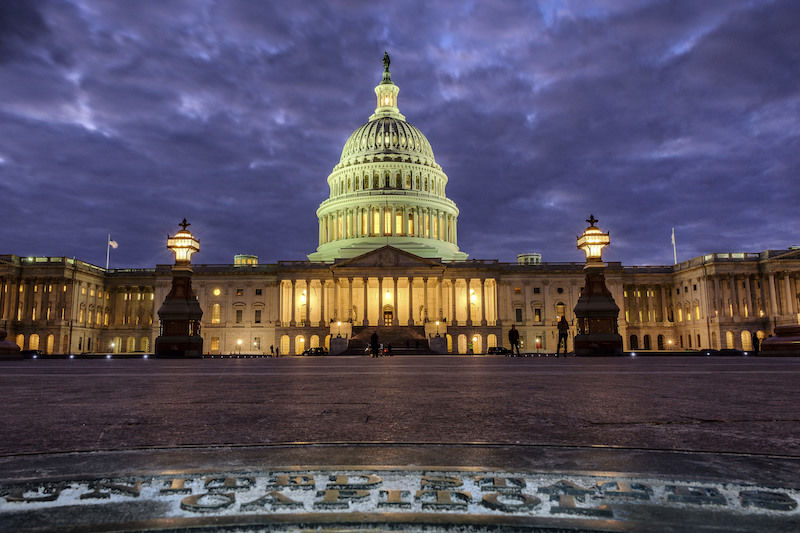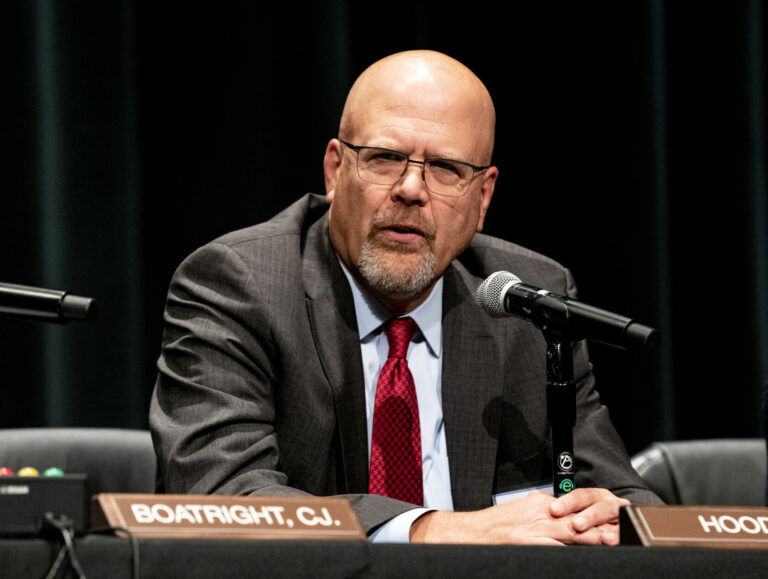How Colorado’s congressional delegation voted this week

H.R. 1625: Consolidated Appropriations Act of 2018
This was a vote in the House to pass the revised version of H.R. 1625, the Consolidated Appropriations Act of 2018.
The $1.3 trillion spending bill passed Thursday with serious doubts whether the Senate would approve it before the federal government budget is depleted at midnight Friday. The same kind of squabbling already led to two short-term government shutdowns this year.
Some of the harshest criticism came from Republicans over a projected bigger budget deficit in the appropriations bill. One of them was Colorado U.S. Rep. Ken Buck, R-Windsor, who said, “Today Congress passed a spending bill that disregards our duty to future generations, adding billions more to the debt, failing once again to seriously tackle our nation’s deficit.”
The bill increases defense spending and puts more money into border security. It would grant President Donald Trump only a portion of the border wall and other security measures he wanted.
House Speaker Paul Ryan, R-Wis., said the 2,200-page appropriations bill is crucial to “rebuilding” the military after its concerns were neglected during the Obama administration.
“This bill starts construction on the [Mexican border] wall. It turns the Gateway decision over to the Trump administration. It funds our war on opioids. It invests in infrastructure. It funds school safety and mental health,” Ryan said in a statement. “But what this bill is ultimately about-what we fought for for so long-is finally giving our military the tools and the resources it needs to do the job.”
Part of the delay that pushed congressional approval close to the deadline came from a dispute over abortion. Republicans wanted to restrict access to abortion from health insurance funds. Democrats opposed the restrictions.
Passed.
H.R. 4227: Vehicular Terrorism Prevention Act of 2017
This was a vote to pass H.R. 4227 in the House.
The Vehicular Terrorism Prevention Act is supposed to improve security against terrorist attacks using vehicles. It requires the Homeland Security Department to report to Congress on its own and the private sector’s emergency preparedness procedures for vehicular terrorism.
The terrorism has included using vehicles to carry bombs and for battering rams to smash into people near roadways. Intelligence experts who testified before the House Subcommittee on Emergency Preparedness, Response and Communications said vehicle attacks are difficult to predict and prevent.
The Homeland Security Department also is required under the bill to make recommendations for improving its training and for information-sharing with the private sector on potential attacks.
H.R. 4227 was authored by Rep. Bob Latta, R-Ohio, who said in a statement, “We’ve seen terrorists in Europe using vehicles, often times rental vans or trucks, to kill innocent people and inflict terror. With the October attack in New York City showing that these groups will not hesitate to carry out the same type of attack here, it’s important that the Department of Homeland Security is doing their due diligence regarding this threat. The Vehicular Terrorism Prevention Act will bolster efforts to address this threat.”
Passed.
H.R. 5247: Trickett Wendler, Frank Mongiello, Jordan McLinn and Matthew Bellina Right to Try Act of 2018
This was a vote to pass H.R. 5247 in the House.
This bill would give seriously ill patients another chance to survive by using investigational drugs that normally might be blocked by the Food and Drug Administration.
To qualify for the experimental treatments, patients need to be near death or have a disease likely to lead to premature death. Their efforts to survive with conventional treatments must have failed.
The investigational drugs available to them must have passed preliminary human testing.
The Food and Drug Administration already has a “compassionate use” program for investigational drugs but it is more restrictive. Patients must apply to the agency for permission to use the drugs. More than 90 percent of the applications are approved, according to the Government Accountability Office.
H.R. 5247 would eliminate the need for patients to apply to the Food and Drug Administration. Instead, they could arrange for permission through their doctors.
Critics of the bill say it could create false hopes for patients and their families. Some of them could be duped into pouring money into drugs that provide no benefit or might even hurt the patients further.
The bill offers drug companies immunity from liability if the drugs fail.
President Donald Trump encouraged Congress to pass H.R. 5247. Vice President Mike Pence help to craft the language of the bill.
Passed.
H.R. 1865: Allow States and Victims to Fight Online Sex Trafficking Act of 2017
This was a vote to pass H.R. 1865 in the Senate.
This bill is designed to be the first law to force criminal penalties onto website owners who fail to control posts that solicit sex. Both of Colorado’s U.S. senators voted for the Stop Enabling Sex Traffickers Act.
The bill would amend the 1996 Communications Decency Act, which grants an immunity to website owners whose users post potentially criminal messages. They have included ethnic hatred, advocacy for terrorism and sexual solicitations.
The reasoning behind the Communications Decency Act’s immunity from liability was that website owners should not be responsible for the actions of persons they cannot control.
H.R. 1865 would allow the government to prosecute website owners who knowingly assist or promote sex trafficking. In addition, visitors to the websites who are offended could sue the owners.
Congress moved to introduce the legislation in response to a website called Backpage.com, which allowed advertisements for child prostitution and other crimes. Witnesses during congressional hearings accused Backpage.com of taking advantage of the loophole that granted immunity to website owners.
“The Communications Decency Act is a well-intentioned law, but it was never intended to help protect sex traffickers who prey on the most innocent and vulnerable among us,” said Sen. Rob Portman, R-Ohio, who was the lead Senate sponsor of H.R. 1865. “This bipartisan, narrowly-crafted bill will help protect vulnerable women and young girls from these horrific crimes.”
Opponents of the bill, such as the Internet Association, say it is too broad. They say it will raise the cost of doing business on the Internet by increasing their liability risks. They also say it sets a dangerous precedent by allowing Congress to limit free speech on the Internet.
Passed.
H.R. 835: To update the map of and modify the maximum acreage available for inclusion in the Florissant Fossil Beds National Monument
This was a vote to pass H.R. 835 in the House.
The entire Colorado delegation to the U.S. House of Representatives voted for this bill to expand the Florissant Fossil Beds National Monument 35 miles west of Colorado Springs.
The National Park Service would manage the donated 280 acres, such as trimming away underbrush that could fuel wildfires. The current 5,992 acres of the Florissant Fossil Beds National Monument provide about $6 million in economic benefits to the region, according to state estimates.
The bill to expand the monument was introduced by Rep. Doug Lamborn, R-Colorado Springs, who said the added acreage would increase recreational opportunities for the estimated 60,000 visitors a year. Gov. John Hickenlooper (D) also endorsed it.
The Florissant Fossil Beds were designated as a national monument by Congress in 1969. The monument is known for its insect and plant fossils found in the mudstones and shales. Argon radiometric dating has shown the Florissant Formation of fossils dates from a lake bed about 34 million years ago.
Passed.
Sources: Govtrack, congressional and media reports














